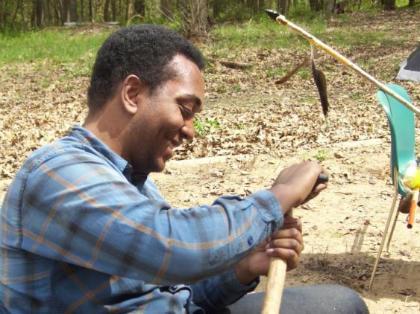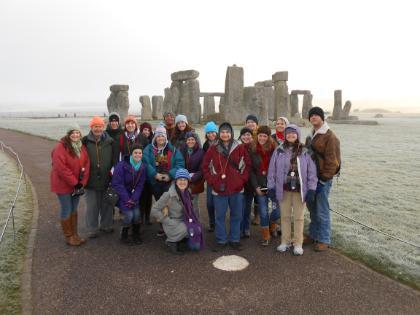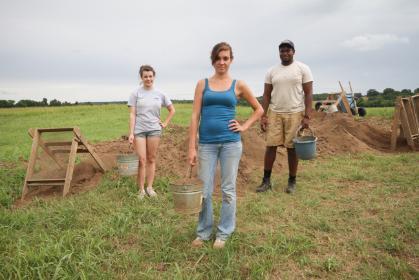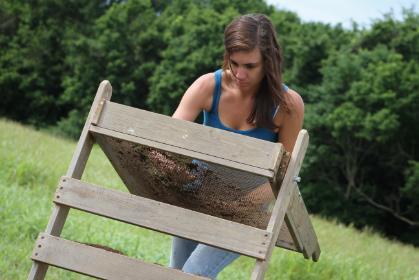

Anthropology and Archaeology
Come unearth the evidence of the origins and patterns of human life with the guidance of Longwood's experienced faculty. You’ll explore the evolution of people and examine the past and present in the villages of New Guinea, on the English countryside, under the forest canopies of Nigeria and our own United States.
Longwood's Institute of Archaeology (IoA) engages in world-class archaeological projects for public and private clients. Through the IoA, undergraduate anthropology and archaeology majors participate in a wide variety of research initiatives and cultural resource management projects. Students also "earn while they learn" through paid positions that build upon theories and skills learned in the classroom.
Career Paths
Anthropology and Archaeology graduates are finding successful careers in a variety of fields. These are some of the things our graduates are doing:
- GIS Technician/ Archaeological Lab Assistant
- Forensic Scientist
- Fire Department Captain
- Maritime Archaeologist
- Restoration Specialist
- State Trooper
- Earth and Environmental Science Teacher
- Principal Investigator and Senior Archaeologist
- Freelance Writer
- Museum Registrar and Collections Specialist
- Archaeological Field Technician
- Network Operations Director
- Officer, United States Navy
- Bank Vice President
What You'll Study
Major
Anthropology focuses on the cultural, social and biological diversity of human groups in the present, historic and prehistoric past. Archaeology examines past cultures through the recovery and reconstruction of material remains.
You’ll examine this great diversity through the study of patterns of culture, social behavior, language structure, archaeological artifacts and evolution. Hands-on laboratory and field research with the Dr. James W. Jordan Archaeology Field School and the opportunity to work with real world clients through the Institute of Archaeology complement the classroom experience.
Minor
Dig around and uncover the past with a minor in Anthropology and Archaeology. You'll explore the development of humanity and explore cultures around the world with our distinguished faculty and a hands-on learning environment. This is an 18 credit minor that requires Introduction to Anthropology.
Research Fellows Program
Longwood’s Institute of Archaeology Research Fellows Program offers a unique opportunity for undergraduate students to explore the field of archaeology, conduct archaeological field research and prepare for future opportunities as a paid student field researcher.
Scholarships are available to assist with tuition for the Field School which is open to ALL majors. Stipends are available to students for advanced research experiences.
Freshmen are encouraged to take Anthropology 202 (Archaeology) in their first (fall) semester. This course is open to all majors and fulfills a Civitae requirement.
Fall semester
ANTH 202 – Archaeology (open to all majors, fulfills a Civitae requirement)
Learn the basics of archaeological research by examining case studies from projects around the world. You’ll apply scientific methods to a small research project involving the use of a prehistoric spear thrower known as an atlatl.
ANTH 280 – Archaeology Laboratory Methods
Work with real artifacts to learn how archaeologists glean information from the material remains of past cultures.
Spring Semester
ANTH 350 – Advanced Archaeology
You’ll be challenged to develop a research design to address a specific archaeological question. Then, as a class, you’ll implement the research design in the field over the course of several weekends of data collection. The final step will be to analyze the data and arrive at conclusions about the site and the original archaeological question you chose to resolve.
Summer
ANTH 296 – Field Methods in Archaeology (Field School) Scholarships available. (open to all majors, fulfills a Civitae requirement)
This is the classic field archaeology experience that Longwood students have been doing for the past 40 years. Head out into the field to conduct a four-week archaeological research project—you’ll get extensive hands-on learning in the basics of archaeological field research.
- 15 students will receive $900 each toward tuition for this course.
Advanced Field Research—Includes Stipend
Ten students will be accepted to serve as Summer Advanced Field Researchers. They will be charged with developing a research project from scratch and bringing it to conclusion over an eight-week period. Working closely with Institute of Archaeology staff, student researchers will plan the project, implement the field research, analyze the data and arrive at conclusions. All of this will culminate in a technical report written to professional standards.
By application. Ten students will be accepted to participate in the Summer Advanced Field Research Program. Each will receive a $3,500 stipend for the 8-week experience
Fall Semester
Institute of Archaeology Student Research Associates—Includes Stipend
Two students will be selected to participate in a semesterlong post-excavation research experience. Working on data derived from the summer field program, each student will conduct an in-depth analysis of data and write an article based on that analysis that will be submitted to a peer-reviewed journal. Students also will present their work at a professional conference.
- By application.
- Research will result in a presentation at a professional meeting, and students will write an article and submit it to a peer-reviewed journal.
- Each student research associate will receive $3,500 stipend.
Archaeology Research Fellows (pdf)
Courses
Examine the diversity of anthropology through a wide range of subjects — courses include Peoples of the Pacific, Supernatural Belief Systems and Forensic Anthropology.




